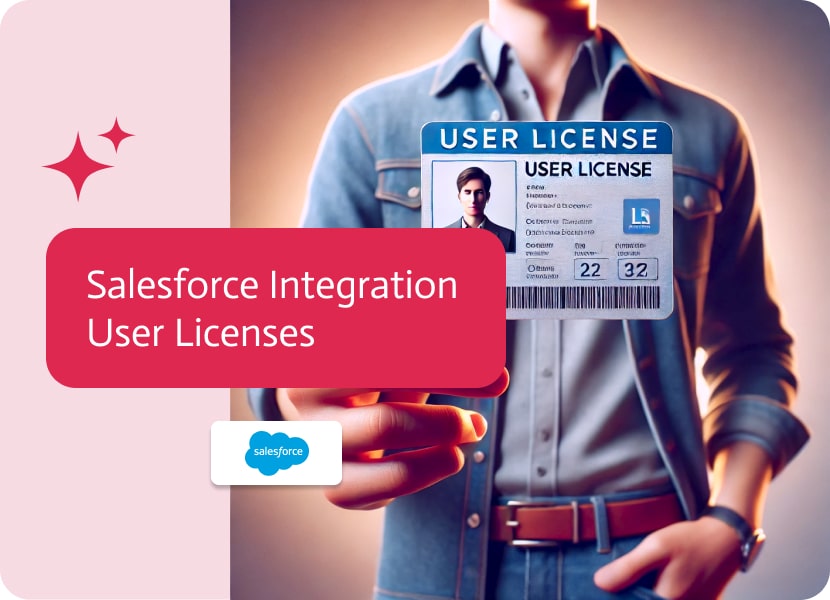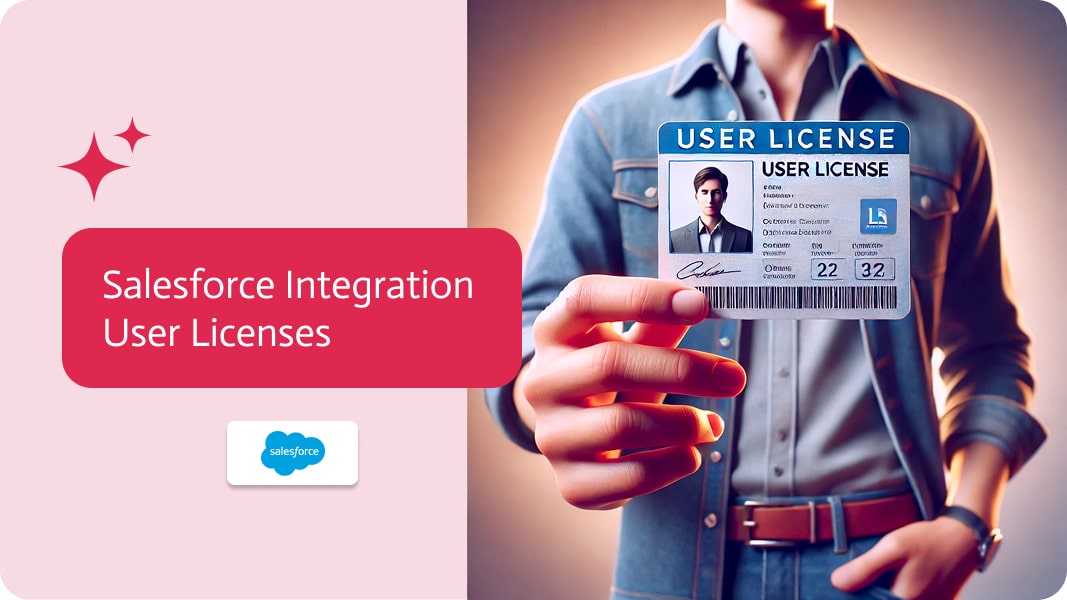

Salesforce Integration User Licenses
Salesforce helps businesses manage customer relationships, streamline operations, and drive growth. As companies expand, integrating with third-party tools becomes crucial. This is where Salesforce Integration User Licenses come in. These licenses are designed to allow secure and cost-effective integrations with external systems, streamlining processes and improving data security.
In this article, we’ll dive deep into Salesforce Integration User Licenses—what they are, their key benefits, and how to use them effectively. We’ll also discuss how to leverage these licenses when working with an iPaaS (Integration Platform as a Service) solution.
What Are Salesforce Integration User Licenses?
Salesforce Integration User Licenses are API-only licenses that allow third-party systems to interact with Salesforce. Unlike standard user licenses, these are meant for automated processes. They don’t require full Salesforce user accounts, making them more cost-effective for organizations with multiple integrations.
Key Features of Salesforce Integration User Licenses
- API-Only Access: These licenses enable external systems to interact with Salesforce through APIs without providing access to the Salesforce user interface (UI). This reduces risks associated with unauthorized data access.
- Granular Permissions: Organizations can control which parts of Salesforce an integration user can access. This minimizes security risks and keeps sensitive data safe.
- Cost Savings: Salesforce provides up to five free Integration User Licenses for users of Performance, Enterprise, and Unlimited editions. Extra licenses cost around $10, making them a cost-effective solution for managing integrations.
- Improved Security: Because these licenses don’t include UI access, they reduce the risk of data exposure. Only authorized systems can interact with Salesforce, ensuring tight security.
The Importance of Salesforce Integration User Licenses
Enhanced Security for Automated Processes
The primary benefit of an Integration User Licenses is security. Unlike standard user licenses, integration licenses limit access to APIs, preventing unauthorized users from accessing the Salesforce interface. This is critical when integrating third-party systems like ERPs, marketing automation tools, or customer service platforms. These licenses ensure that only authorized systems can interact with Salesforce, reducing the risk of data breaches or accidental exposure of sensitive information.
Cost-Effective for High-Volume Integrations
Another key advantage is cost savings. Using full Salesforce user licenses for integration purposes can be expensive, especially for businesses that handle high data volumes. Salesforce offers five free Integration User Licenses for Performance, Enterprise, and Unlimited editions, with additional licenses available at a low cost. This makes them ideal for businesses needing to scale their integrations.
For companies processing large amounts of data, the savings can be substantial. By using these specialized licenses, businesses can manage multiple integrations without paying for full Salesforce accounts.
Simplified Tracking and Auditing
Integration User Licenses make it easier to track and audit data changes. When each integration is assigned its own license, it’s easier to see which system made specific changes. This is important for businesses that must comply with industry regulations or internal data policies.
For instance, if a marketing tool updates lead data in Salesforce, the integration user license can track those changes. This visibility simplifies troubleshooting and ensures data integrity, making it easier to comply with regulatory requirements.
Using Salesforce Integration User Licenses with iPaaS Solutions
As more companies adopt iPaaS (Integration Platform as a Service) solutions like Noca AI, Zapier, and Workato, the value of an Integration User Licenses increases. iPaaS platforms enable businesses to automate workflows across multiple systems. When used alongside Salesforce Integration User Licenses, these platforms can help businesses simplify their integration architecture, improve security, and reduce costs.
1. Streamlining Multiple Integrations
With an iPaaS, businesses often manage several integrations at once. For example, a company might connect Salesforce to its ERP, marketing tool, and customer service platform. Instead of assigning a full Salesforce user license to each of these connections, businesses can use a sugnal Integration User License. This keeps costs low while ensuring that each system has secure API access.
2. Reducing Administrative Work
Managing integrations manually is labor-intensive. With iPaaS platforms, much of this work is automated. Using Integration User Licenses further reduces the need for manual intervention. Assigning an integration user license to each iPaaS-managed workflow ensures proper tracking and auditing, simplifying administrative tasks.
3. Increased Security
iPaaS platforms often handle large volumes of data across multiple systems. By using an Integration User Licenses, businesses can restrict access to only the necessary data. This API-only access ensures sensitive Salesforce data remains secure and is not exposed to unauthorized users.
Assigning a dedicated integration user license to each iPaaS workflow ensures that each process has the correct level of access, boosting overall security.
4. Tracking Data Changes
One of the strengths of iPaaS platforms is their ability to handle complex data flows. When paired with Integration User Licenses, this becomes even more powerful. Each system’s interactions with Salesforce can be tracked, making it easy to audit and troubleshoot.
For example, if a business is syncing customer data between Salesforce and its marketing tool, Integration User Licenses help monitor all data updates. This clarity simplifies troubleshooting and helps ensure compliance with internal policies and regulations.
5. Scaling Cost-Effectively
As businesses grow, so do their integration needs. Scaling integrations through iPaaS can become costly if full Salesforce user licenses are required. However, Integration User Licenses offer a more affordable way to scale.
For example, a business managing five different integrations can use Salesforce’s five free Integration User Licenses. If more licenses are needed, they can be purchased at a minimal cost, allowing businesses to scale their integrations without breaking the bank.
Best Practices for Using Integration User Licenses with iPaaS
- Assign One License per Workflow: Assign a dedicated Integration User License to each iPaaS workflow for better visibility and control.
- Audit Regularly: Regular audits of integration activities help ensure that workflows are functioning properly and data is syncing as expected.
- Use Permissions Carefully: Ensure each Integration User License has the correct permissions. This minimizes security risks and ensures that each integration point operates with the right level of access.
Challenges and Limitations of Salesforce Integration User Licenses
While an Integration User Licenses offer many benefits, there are a few limitations to consider:
1. Limited User Interface Access
Since these licenses are API-only, they won’t work for integrations that require manual interaction with the Salesforce UI. In such cases, businesses will need to assign standard user licenses.
2. Limited Licenses for Developer Orgs
While Performance, Enterprise, and Unlimited edition users receive five free licenses, Developer orgs only get one. Additional licenses are available at a cost, which may be a limitation for development environments with multiple integrations.
3. Complex Permission Management
Managing permissions across multiple integration tools can be complex. Each tool may require different levels of access, making it essential to review permissions regularly to avoid security risks.
Conclusion
Salesforce Integration User Licenses provide a secure, cost-effective way to manage third-party Salesforce integration. These licenses allow businesses to maintain control over their data while reducing the costs associated with full Salesforce user licenses. When paired with iPaaS solutions, they offer even greater flexibility and scalability, allowing businesses to manage multiple integrations seamlessly.
By following best practices—such as assigning dedicated licenses for each workflow and conducting regular audits—organizations can optimize the use of these licenses. With a clear understanding of their benefits and limitations, Salesforce Integration User Licenses can significantly enhance your Salesforce experience, leading to smoother operations and improved security.


